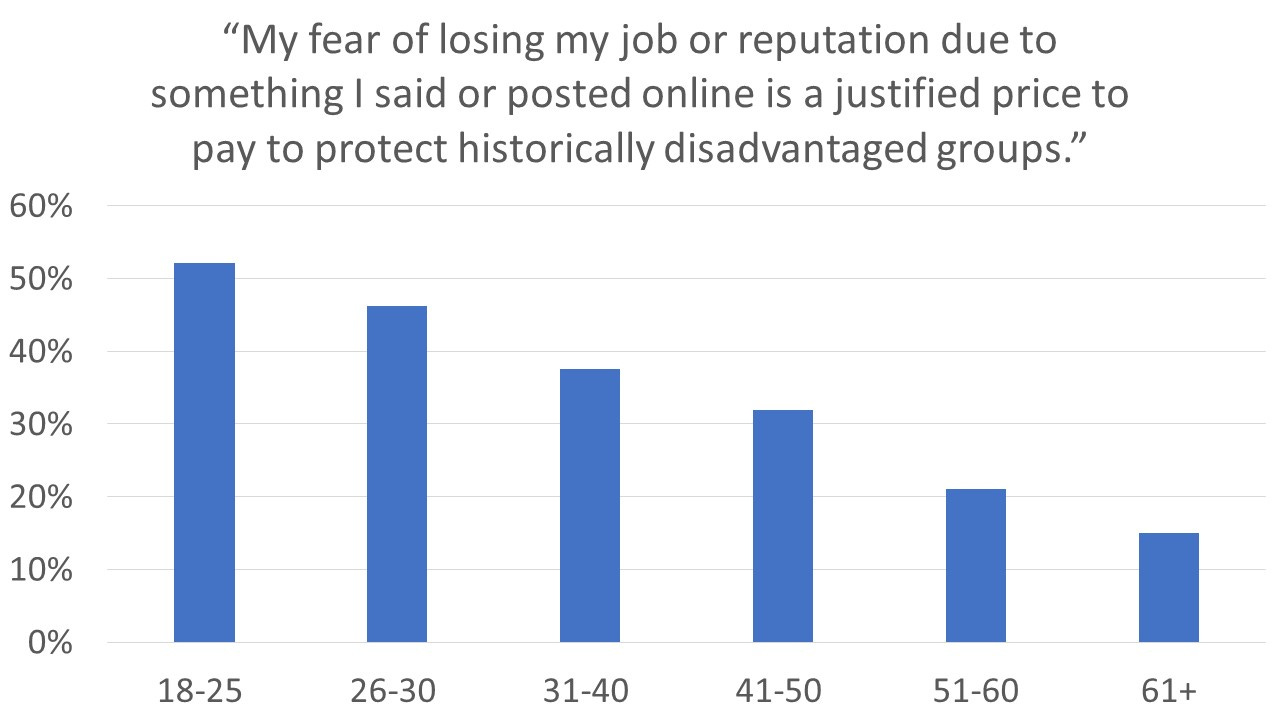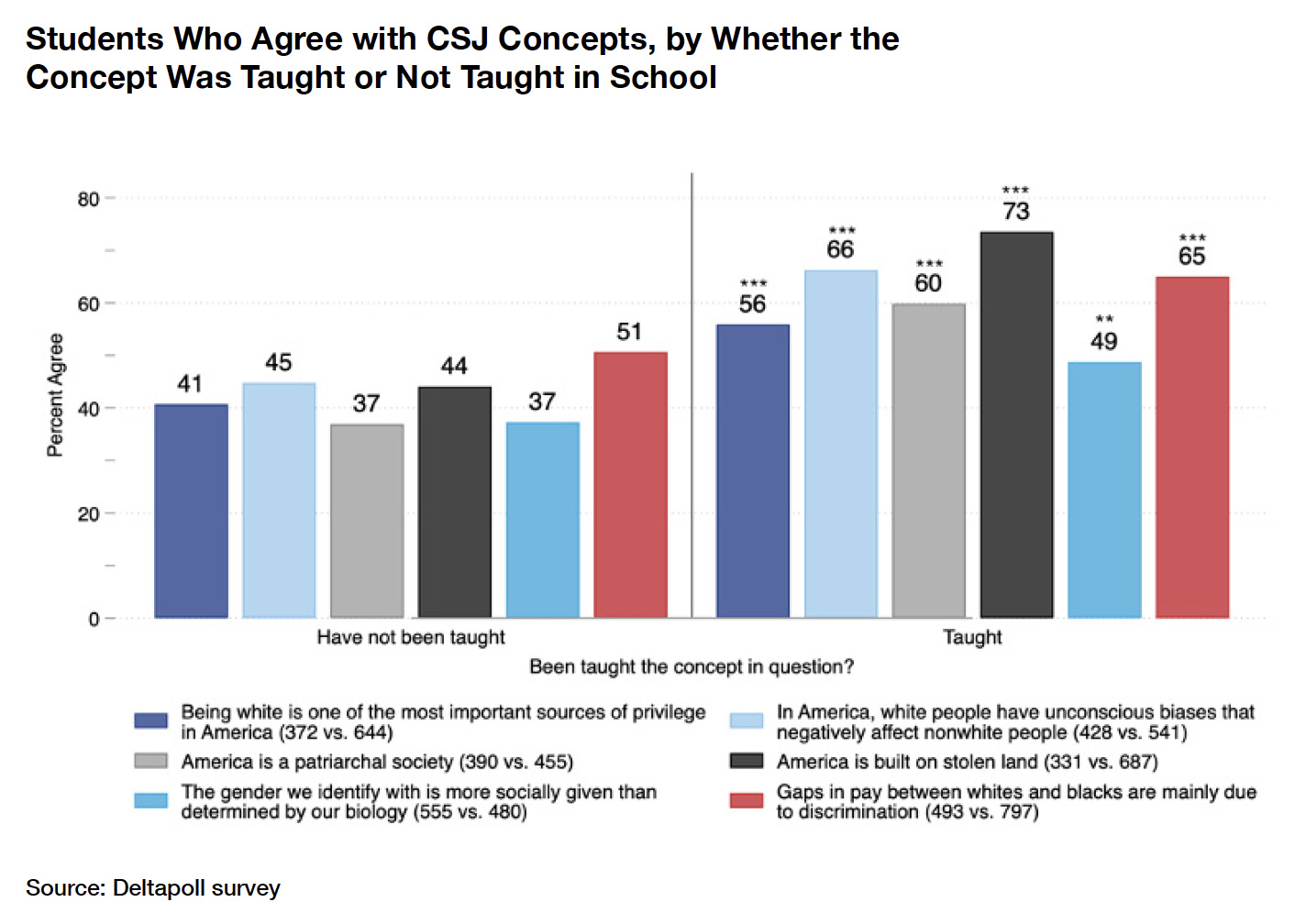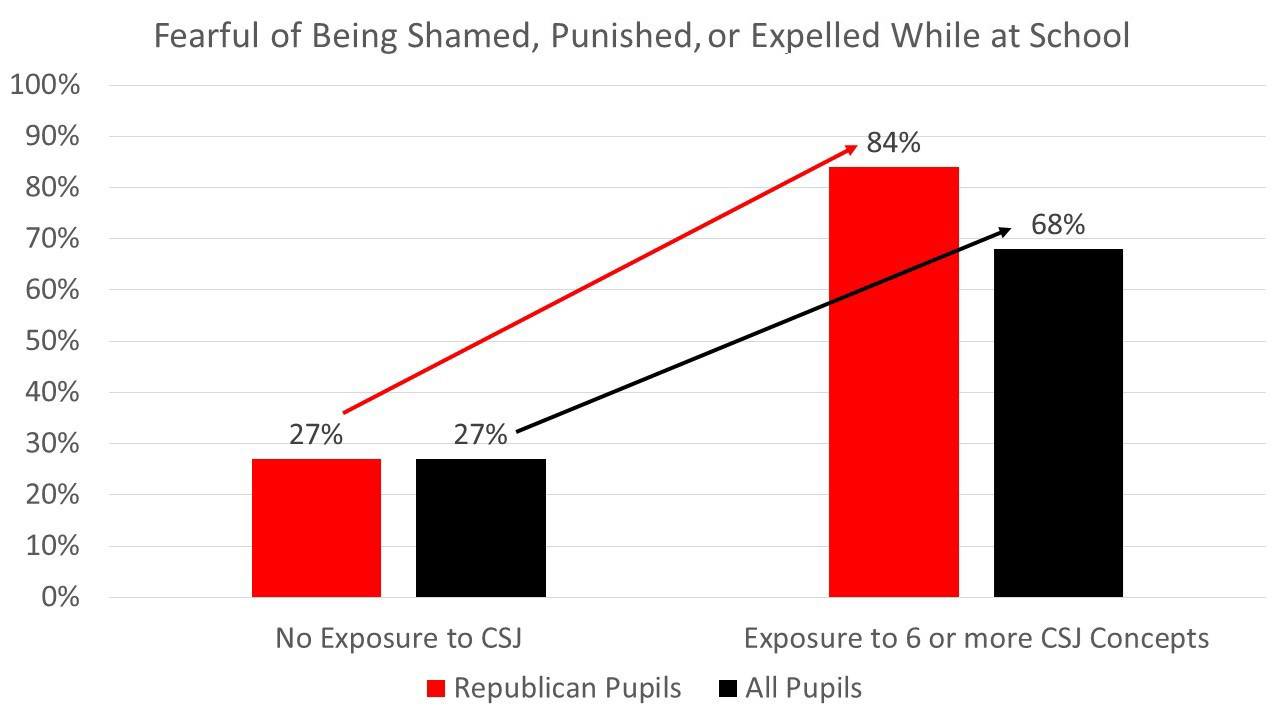The Indoctrination of the American Mind New research shows that the ideological transformation of our schools is widespread—and should concern anyone who cares about open inquiry and free speech. Eric Kaufmann
https://www.thefp.com/p/how-american-schools-indoctrinate-kids?utm_source=substack&utm_medium=email
If you read The Free Press, you know that over the last decade, an illiberal ideology that goes by various names—Critical Race Theory; Critical Social Justice—has transformed key institutions of American life. It is remaking the law, Hollywood, medicine, higher education, psychology, and more.
No area, however, is more important than our schools, which shape the minds of future citizens. And across the country, teachers are now engaged in the wholesale indoctrination of their pupils.
The Evanston–Skokie School District teaches K–3 students to “break the binary” of gender. Seattle Public Schools tell teachers that the education system is guilty of “spirit murder” against black children, while a Cupertino, California elementary school forces third-graders to deconstruct their racial and sexual identities and rank themselves according to their “power and privilege.” In Portland, K–5 students are taught to subvert the sexuality of “white colonizers” and explore the “infinite gender spectrum.” And thousands of similar examples, perhaps in your own community.
Yet many refute the claim that this ideological transformation is happening at all. Which is why we thought it was crucial to ground the anecdotes that sometimes make headlines in representative, large-scale data. We wanted to understand the impact that this reprogramming is having on young people’s ideas about race, gender, identity and more.
A recent survey of 1,500 Americans aged 18–20 that I conducted with Zach Goldberg for the Manhattan Institute proves just how widespread and pernicious this issue has become. It has implications that should concern anyone who cares about open inquiry and free speech.
We asked a random national sample of 18- to 20-year-olds whether they had heard (from an adult in school) of pro–Critical Race Theory (CRT) concepts such as “white privilege” or “systemic racism” as well as radical gender concepts such as the idea that gender is separate from biological sex. An astounding 90 percent had been exposed to CRT and 74 percent to radical gender concepts at school. In 7 of 10 cases these beliefs were presented as fact, or as the only respectable view to hold.
Why does this matter? Increasingly, evidence is pouring in that young people are intolerant of opposing views.
For instance, nearly 70 percent of undergraduates polled in a 2021 study said that if “a professor says something students find offensive,” they should be reported to the university. The massive Foundation for Individual Rights and Expression (FIRE) surveys of 2020–2022 find that 65 to 85 percent of American undergraduates believe universities should not permit speakers on campus who argue that some transgender people have a mental disorder, BLM is a hate group, or abortion should be illegal.
When compared to older age groups, young people are far more intolerant, even when taking their politics into consideration. As I show in this report, over two-thirds of 18- to 25-year-olds think Google was right to fire programmer James Damore in 2017 for raising evidence-based questions in an internal memo about the firm’s gender equity policy. This compares to just 36 percent of those over 50 who backed Damore’s termination. Among liberals, I found that 82 percent of 18–25-year-olds support his firing while a much lower 57 percent of liberals over 50 do.
Not only are educated young people intolerant of opposing ideas, they are increasingly unwilling to date or befriend Republicans. According to original data that I analyzed from FIRE’s 2020 survey, just 7 percent of female and 19 percent of male college students who are not Republican would feel comfortable dating a Trump supporter.
Original data from our Manhattan Institute survey showed that support for CRT undergirds these disgust reflexes. For example, 77 percent of “very liberal” young adults who say being white is “one of the most important sources of privilege” are uncomfortable dating a Trump supporter, compared to 27 percent of “very liberal” young people who do not believe that being white is one of the most important sources of privilege.
But dating is a personal choice. The same cannot be said for discrimination in hiring, which violates people’s right to equal treatment regardless of personal belief. Yet the two are connected: Goldberg and I found that young people who are uncomfortable dating a Trump supporter are much more likely to discriminate against them in hiring. Just 31 percent of young Democrats who say they would be uncomfortable dating a Trump supporter would hire a “known Republican” for a job, compared to 66 percent of young Democrats who would be willing to date a Trump supporter.
Original data from our study found that racial attitudes underpin the binary thinking behind negative partisanship. For instance, 44 percent of white liberals aged 25 or under say that “people who disagree with me politically are immoral,” compared to about a quarter of white conservatives and black liberals, and zero black conservatives. Why? It turns out that white liberals who believe that “white Republicans are racist” are far more likely to moralize their political views. The upshot of this is that progressive beliefs around identity—notably race and gender—are central to understanding the new moral absolutism of young liberal Americans.
This is not about the universal tale of young versus old. Whereas young and university-educated people used to be the most tolerant and morally relativistic, they are now more likely to believe in absolute right and wrong. As California political scientists Dennis Chong, Morris Levy, and Jack Citrin show, using data collected since the 1970s, young people’s tolerance for dissent has gone into reverse only on questions of identity.
An acute sensitivity to emotionally “harming” historically marginalized race, gender, and sexual identity groups is what drives cancel culture. An illustration of this is provided in Figure 1, which shows that a majority of young people agree with the statement “My fear of losing my job or reputation due to something I said or posted online is a justified price to pay to protect historically disadvantaged groups,” while less than a fifth of those over 50 feel the same. Paradoxically, many young people today worry about cancel culture, yet also embrace its punishing ethos.
Figure 1
Progressive schools where pupils hear a lot of ideas supportive of Critical Social Justice (CSJ) turn out radically progressive graduates. Comparing young people who heard no CSJ at school to those who heard at least six CSJ ideas shows that CSJ exposure increases belief in white privilege from 41 percent to 56 percent; in gender as chosen from 37 percent to 49 percent; and in the idea that America is built on stolen land from 44 percent to 73 percent.
Figure 2, which focuses on the Critical Race Theory (CRT) component of CSJ, shows that moving from no CRT exposure to being taught a maximum of five CRT concepts is associated with a significant shift in racial policy attitudes toward the cultural left. These young people are being indoctrinated to support affirmative action and equal outcomes over colorblind merit, an abuse of our liberal education system, which is meant to teach how to think—rather than what to think.
Figure 2
Those on the left, even people leery of CSJ, might be tempted to accept indoctrination and cancel culture as a price they are willing to pay to win the next generation to their side. However, before they break out the champagne, they may wish to consider the negative effects of this programming on the very groups they aim to help.
First of all, CSJ instruction damages young people by making them fearful of being punished for what they might say. Figure 3 highlights that 27 percent of pupils exposed to no CSJ in school feared being shamed, punished, or expelled for voicing their opinions on controversial subjects, compared to 68 percent of those hearing six or more CSJ concepts. Among young people who identify as Republican, my original data show the jump is from 27 to 84 percent, a major blow for free speech, political tolerance, viewpoint diversity, and the mental well-being of youth.
Figure 3
Striking fear into pupils results in less expressive freedom, which makes race relations more strained. The share of nonblack pupils saying they felt uncomfortable criticizing a black classmate increases from 32 percent to 50 percent between those with no CSJ exposure and those with heavy exposure to CSJ. The same results can be seen with corporate DEI programs, which sharply increase workers’ reluctance to criticize a black coworker. If a black pupil or a coworker doesn’t receive constructive criticism of their performance or ideas, they are likely to be disadvantaged compared to their nonblack peers.
So what can we do? While free-market conservatives think school choice is a panacea, the reality is that CSJ is as prevalent in private and parochial schools as in public schools. A full 86 percent of homeschooled children report being taught (or hearing from an adult about) at least one CSJ concept, as do 88 percent from the most heavily Republican fifth of counties in the data, according to my own analysis.
Until teacher training and the curriculum are overhauled, nothing will change. CRT bans, tighter guidelines on the teaching of gender and sexuality, and curriculum transparency are vital steps in the battle to preserve Enlightenment values and national cohesion. Government-led reform is key, but it is not enough to turn the tide. If the culture is lost, then legislation will eventually be undone. Rather than engage in a spat between proponents of government action and those who believe that the battle of ideas if sufficient, we need a new approach.
I believe both government intervention and long-term cultural persuasion is needed to align curriculums with the traditional liberal values embodied by a true democracy. Defenders of Enlightenment values also must be bulletproof. I hope that this data helps those who care about this critical challenge to address it head-on.
Comments are closed.




